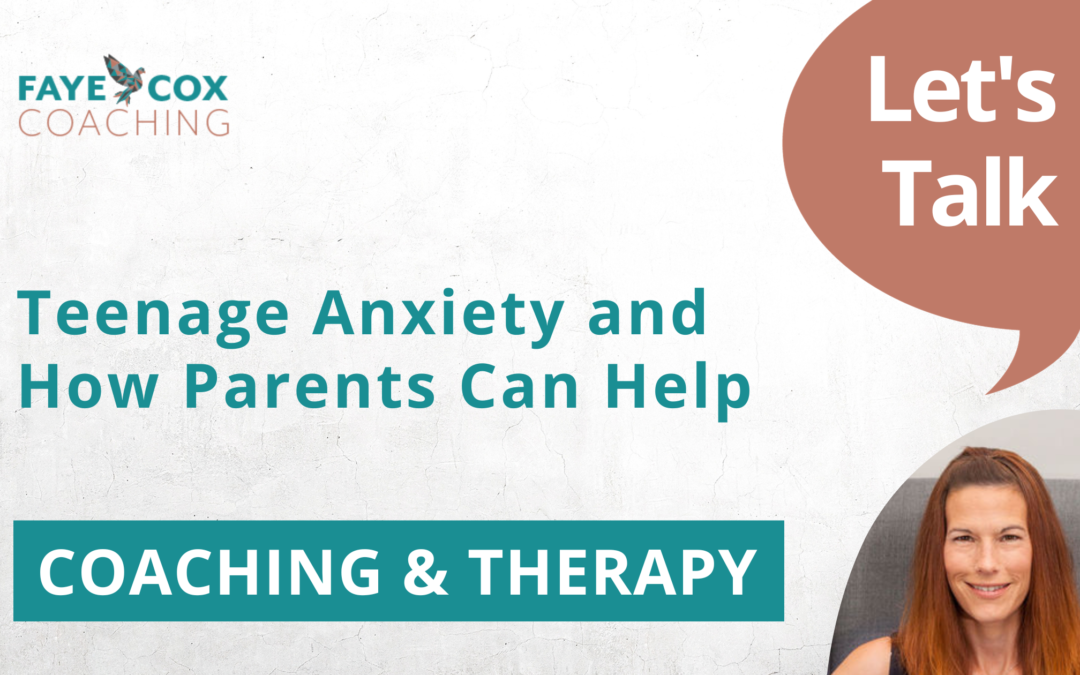
by Faye Cox | Sep 26, 2023 | Anxiety, Coaching, NLP, Parents, Stress, Teens, Wellbeing
What is Anxiety?
Everyone experiences feelings of worry from time to time. In fact worry is a natural response to the pressure of daily life and its our brains way of letting us know that something needs our attention. We can actually use our worry to our advantage when we’re doing something that we’re passionate about or something that is of risk, but that is a positive and calculated one.
In today’s hectic and constantly busy world it’s no surprise that people are experiencing more worry. Mainstream and social media play a big part in today’s constant feeling that a threat is just around every corner. The fact that our children and young people are increasingly more exposed to ‘perceived’ danger can become all consuming for their underdeveloped brains to cope with.
As humans we are conditioned to look out for threats, just as we did in the caveman days when the biggest threat was being attacked by a bear. As we’ve evolved our brains are still programmed to look out for the ‘Bear’, only 9 times out of 10 there isn’t one, but our minds cannot tell the difference between a perceived threat and a real one so we can become overly worried about something that isn’t real even though it emotionally and physically feels like it is. The good thing here is that we can use that to change the way we think of things and enable us to thank the bear for coming to keep us safe, but that he’s not actually needed here and can move aside.
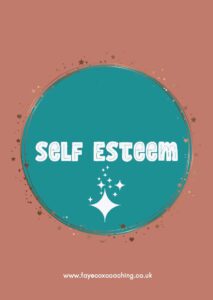
Signs of Child and Teenage Anxiety
As parents it can be difficult to spot the signs of child and teenage anxiety so here are the most common:
- Lack of eye contact (this is a sign that they are shutting down emotionally)
- Shoulder shrugging when being spoken to (this is a sign that the brain is overwhelmed)
- Inability to focus (due to the anxiety becoming all consuming)
- Headaches and stomach aches (these are physical symptoms that anxiety is present)
- Tiredness (another sign that they are shutting down emotionally and physically)
- Feelings of sadness (due to not being able to understand what’s happening)
- Challenging behaviour (down to them not having the skills yet to communicate their fears)
- Rudeness (the logic part of the brain has gone off line and again they are struggling to understand and communicate their fears)
- Panic attacks (this happens when they can no longer control the physical and emotional symptoms and their anxiety has fully taken over)

The Fight, Flight, Freeze response
The above signs are a result of your child or young person entering what we call the ‘fight, flight, freeze response’ (FFF for short). Becoming aware of which response is their go to one, can be incredibly useful to both you and them. Becoming aware of your own is also key for you being able to regulate yourself when things get tough for your child or young person.
For simplicity let’s use the example of the BEAR in terms of how you deal with it when each of the FFF responses are switched on.
Fight – Speaks for itself really as you will want to fight the bear when this response is triggered
Flight – Again it’s quite self explanatory as when this response is switched on you will want to run from the BEAR
Freeze – In this response you will want to hide from the BEAR. Like a chameleon, you may want to blend in and disguise yourself so the bear can’t see you.
It’s very natural to enter all 3 responses. For example, you may initially fight and then freeze, or fight and then flee, or flee and then freeze. However, we tend to have an initial go to response in the first instance which is a tell tale sign that the response has been triggered.
In terms of school, this can lead to avoidance of either people, places or situations that are triggering one of these responses.

What can parents do to help Teenage Anxiety?
Another difficulty for parents can be that their child or young person may not be able to express how they feel. Parents need to feel comfortable really listening to what is being said and to remain curious when speaking to their child or young person about their feelings. Parents also need to know how to model healthy regulation of their own emotions which can be hard for some, particularly if this wasn’t modelled for them as a child.
When a young person reaches secondary school age they may be able to recognise their own feelings, but are still unable or unwilling to discuss them. The human brain is not fully developed until around 25 years of age and up until that point we live primarily in our emotional brain, and when our young people hit puberty there is a development surge in the brain which can cause A LOT of big emotions that as adults we see as over-reacting, but to our young people this is very REAL and often a scary and confusing time.
Allowing a space for your child or young person to turn to where they know they will be fully seen and heard is incredibly powerful. They don’t always want you to fix their worries. Quite often they just want you to sit in their worry with them for a while whilst they work it out for themselves.
If you found this article and teenage anxiety helpful you may like to visit the online shop or digital download pages on the website for more helpful resources to further support your child or teenager with anxiety.

by Faye Cox | Mar 15, 2023 | Anxiety, Coaching, Parents, Stress, Teens, Wellbeing
Wonderful things happen when you switch off from the noise of the outer word and focus on connecting with your teenager.
Having put in a boundary (these are so important through the tween & teen years) around phone and social media usage of an evening, our family is learning to better communicate and having some great discussions and openly talking around our day and the issues and even the good parts of the girls school day experiences.

Friendships and Social Media
Both girls have been having some issues around friendships and social media. Tell me a young girl who hasn’t! and they have been learning some tough life lessons on what’s right and wrong and what’s appropriate and not appropriate and what the consequences are of certain actions, not just for them but for those around them also.
Any woman will tell you that female friendships are incredibly complex at the best of times. Throw in 24/7 access and keyboard warrior bravery and you’ve got one hell of a pressure cooker going on inside a young girls head. A young girl who is new to navigating this level of pressure and who is only just starting to make sense of herself and the world around her.
Our girls are learning that their human brains are not designed to be ‘switched on’ all the time, that they’re not built for 24/7 access and that this is causing stress and anxiety as they are being exposed to what people are doing, thinking and how people are behaving towards them and others around the clock. They’re realising that it’s exhausting and that it’s affecting their mental health.

Validating their feelings
In one of our chats in my eldest daughter’s bedroom one night, we were discussing an issue that she was experiencing and both myself and my youngest daughter just listened and validated how she felt. We could both relate to what she was feeling, as we’ve both felt it too, but rather than go straight in to this is what you should do mode, I sat back and asked her some further questions about the situation so she could see all sides of what was going on and she could understand how others may also feel. Having this perspective allowed her to find some resolutions to the problem herself. Only then did I tell her my own experience and what happened for me back when I was at school.
We all talked about what it is to be a friend and what kinds of people we want in our lives as friends too. That friends are not perfect, and neither are we. That friends won’t always agree with us, and that doesn’t mean we can’t be friends with them, but how important it is to have a mutual respect for each other and the way we communicate our needs.
The hour we spent together reminded me so much of when I was at school, and me, my sister and mum would do the same thing. We would all be together in the kitchen after school and mum would listen to our troubles, offer her wisdom and then allow us to make our own decision.

When the shift happens
Amazing shifts take place when you genuinely connect with your kids on their level. When you listen to understand, rather than to judge, when you ask questions, as appose to lecture, when you validate their feelings instead of teaching them to bury them. When you connect on their level, they will listen to your guidance, they will ask questions and they will further open up knowing they can trust that you’re not going to go off your head in that moment, (even if your exploding on the inside!). Your child is not perfect, and they’re going to make mistakes that make your hair curl and your nerves stand on end. They’re going to do things that you don’t agree with and things that you consider to be wrong, but at the end of the day they’re still learning and as parents so are we.
This isn’t soft parenting as some people see it. This is building the foundation of mutual trust and understanding. It’s teaching them that it’s OK to talk about things and that it’s OK to ask for help. Most of all it’s about teaching them emotional Intelligence so that when they grow up, and they’re through those difficult teenage years where their emotional mind is very much leading the charge, they will be well rounded individuals who know how to emotionally support themselves and the people around them.
If you’d like to find out more about supporting your tween or teenager to make sense of themselves and the world around them you can contact me using the contact form.
You can also purchase my book ‘Making Sense of Me’ – a book written to my younger self and a guide for all teenage girls to support them in making better sense of themselves and the world around them.
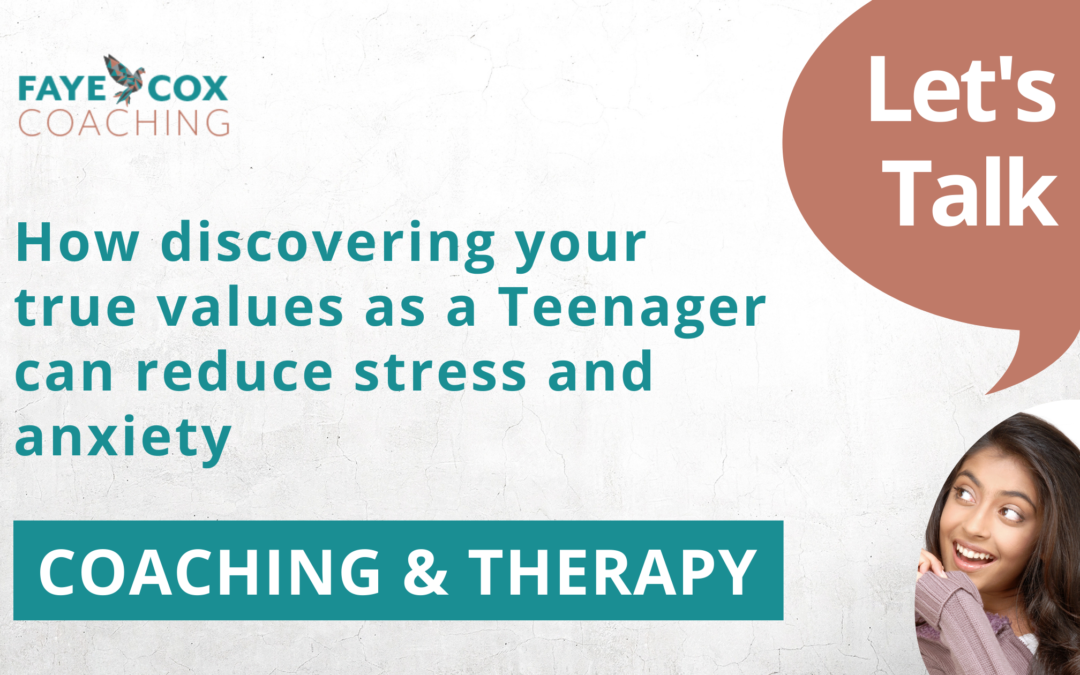
by Faye Cox | Feb 3, 2023 | Anxiety, Coaching, Family, Parents, Stress, Teens, Tips, Uncategorized, Wellbeing
What are Teenage Values and Beliefs?
As human beings, we all have our very own map of the world. No two people’s are ever the same. You can be an identical twin, yet your world map will still differ.

No other person has experienced life through your lens. No other person has seen, heard or felt things exactly the same way you have. This is hugely beneficial to learn as it can relieve the pressure of feeling like you have to be like other people.
Values
Values are the things that are important to you. I call these your non-negotiables in life. For example, my values are honesty, compassion, empathy and respect. I live by these values, and when I feel one of them is not being met either by myself or by those closest to me, it can cause stress and anxiety.
Beliefs
Beliefs are what you believe to be true about yourself and the world around you. These can be anything from thinking that you’re not good enough at something, not tall enough for something or even that you can’t do something for whatever reason you’ve convinced yourself is true.
When you’re a young child, your values and beliefs are automatically the same as those closest to you: your parents, older siblings, grandparents, etc. But when you reach your teenage years, your actual values can get lost and confused with other people’s. You can even begin to doubt your family values and believe other families’ values align with what you want to believe.
These beliefs may suit your current lifestyle more, or they might be more relaxed, and that’s okay. It’s completely normal to question what you believe to be true and what your parents believe to be true as long as you do it respectfully. Remember, your parents may have lived by these values for a long time and will be deeply embedded in their minds. For someone to come along and question them can feel difficult and uncomfortable and like someone is disrespecting them.

As with most parents, they may not even know why they have them in the first place, as they too will have inherited some of their beliefs from their parents a long time ago.
When I was a child, my parents firmly believed that drawing on anything apart from paper was wrong. I know this was to stop me from writing on the walls when I was a toddler. Your parents may have told you the same thing. As an adult, I can realise what this means. Still, as a young child, this became so embedded in my mind that I believed that I was never to draw on anything except paper.
When my children suggested that we draw a rainbow on the pavement for the NHS during COVID, my instant reply was ‘no’. To which they both asked me why. I gave them the old ‘because I said so’ answer and thought that would be the end of it. But then they asked me why it was so wrong and gave me two very valid reasons why it should be okay; one being that it was to show support for the NHS and the other that they could easily wash it off.
Well, what could I say? I had nothing; no comeback could back up this belief my parents had given me as a young child. I even asked myself why and to my amazement, I had no real reason. I had acted instantly and unconsciously due to something drummed into me as a child. I’m sure you can guess what happened next – I told them we could get some chalk and create our rainbow. Their faces were a picture, and our rainbow was the talk of the close and stayed put until the rain came and washed it all away a few days later.

Why am I telling you about my old belief and rainbows? I want you to know that even we adults have old and outdated beliefs that influence our decisions regarding our children. Be mindful of this when your parents question your reasons for doing something.
It means that you, too, can change your beliefs about yourself. You, too, can believe that you CAN do something, that you are good enough.
When it comes to many things in life, it’s a good idea to take a closer look at your values so that you can live authentically as you. It can be difficult with so many outside influences, especially friends, but it’s fundamental to discover who you are and who you want to be.
So, how do you go about discovering your teenage values? I do this with all the young people I work with, and here is an exercise you can complete to do just that.
Teenage Values exercise
- Write a list of everything important to you, eg. family, friendship, kindness, integrity, honesty, learning, money, success, well-being, giving back to the community, faith, and caring for yourself and others.
- Narrow down your list to your three most important ones.
- Write down why each of these three values is important to you.
- Write down who you know who shares all three values.
- Write down who you know who shares at least two of these values.
- Give an example of how you live by each of your chosen values.
If you’re not already living by these three values, how can you make the necessary changes to include these in your everyday life? Are you living by these values in some parts of your life and not others?
If like so many other teenagers I work with, you’re finding it difficult to know what you believe to be true or how to live authentically as you then check out my book ‘Making Sense of Me’ which is out now. Alternatively you can book a call with me
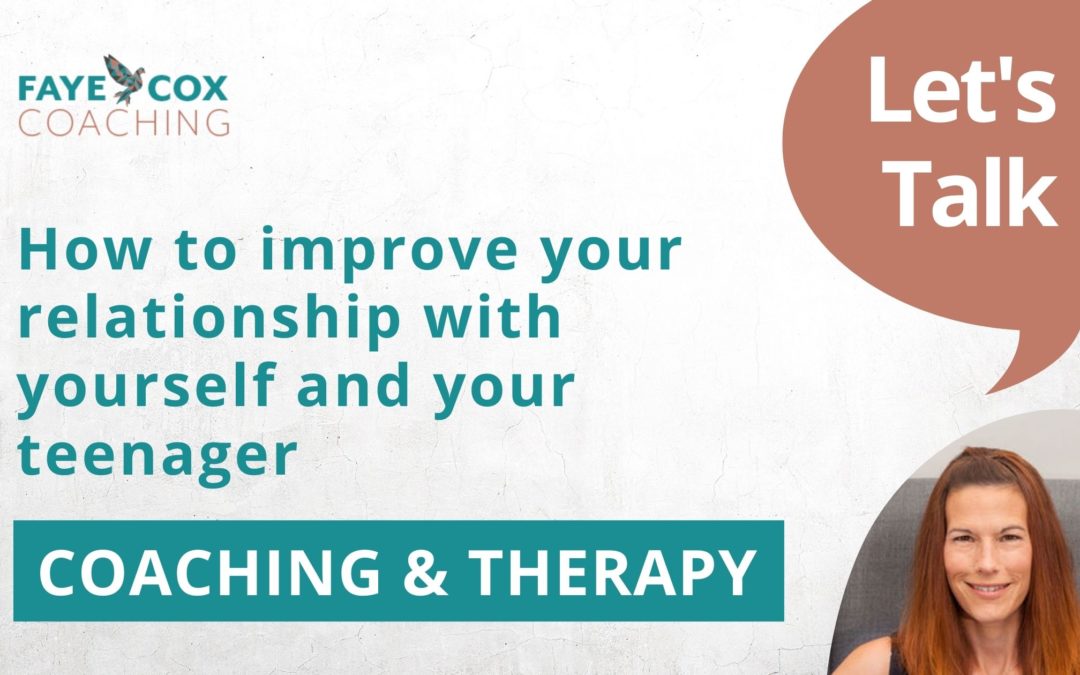
by Faye Cox | Apr 22, 2022 | CBT, Coaching, NLP, Parents, Teens, Therapy, Wellbeing
How to improve your relationship with your teenager?
As parents, we want quick, practical, and affordable and effective solutions. Coaching and therapy may seem like it is not, a quick or affordable solution but I’m here to explain why it absolutely is.
Many parents ask themselves these questions
How do I improve my relationship with my teenager? How can I communicate better with my teenager? How to parent a rebellious teenager? How to parent a teenager with depression? How to parent a teenager with Anxiety? How to parent a teenager with ADHD?
There’s so much information and advice out there, but it’s not always that helpful. Some methods will work for some and not for others.
My NEEDS audit sessions are designed to help you answer many of these questions, helping you to reconnect with your teen find the best solutions to overcome any stress and anxiety that you and your teen may be experiencing.
Working with me will improve your relationship both with yourself and your teenager
When most people think about coaching and therapy, they want to know what the benefits are. What exactly are they going to get for their money?
We know that when we purchase something completely tangible we’re getting a physical product or a visible service, but when it comes to coaching and therapy as humans we need to be able to see and feel the results, and most of the time we want to see and feel things FAST.
Well, I can tell you that working with me will enable you to see and feel change FAST. It would be wrong of me to say that results happen overnight because they don’t, but what they do, is create long-lasting change that can and will start from the very first session.
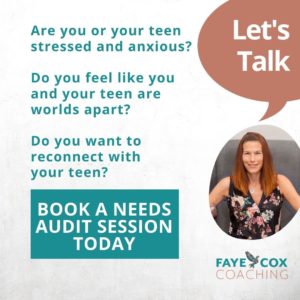
How do we work together?
Whether I’m working with you or your teenager or working with you together, my aim is always to give you a FASTER, deeper and longer-lasting effect.
We conduct a NEEDS Audit which brings huge insight into where you and your teenager are now, and where you’d like to be.
It also provides me with the foundation of our working relationship. This is where I will gather the information I need to support you in creating that long-lasting change. This forms the framework for the rest of our time together.
Then we go deeper into some of the unmet needs from the audit and put together an action plan. As well as putting some strategies in place you can use at home and even within school if needs be.
This is done through a series of 6 sessions, where I will carry out some sessions individually and some with you both. In the last session, I will bring you back together to talk through how things are going, and see where there may still need to be some suggestions and work.
What do you get from me?
During our time together, you get full access to me via WhatsApp and email for any queries or support needed in between sessions.
You will also receive a copy of each of my journals and a set of affirmation cards designed specifically for tweens and teens.
You will deeply benefit from going through the cards and exercises within the journals with your teenager as this will deepen your connection and communication even further.
You also get the benefit of my vast experience of working with teenagers and parents together, as well as my knowledge of using Coaching, NLP, and CBT effectively with this age group.
How long do we work together for?
We work together for 3 months, starting with the NEEDS Audit lasting 90 minutes, which is followed by 6 further sessions lasting approx. 60 minutes.
How much can I expect to pay to work with you?
I pride myself on offering affordable services as I believe that every young person and their family deserves to thrive.
I also offer affordable resources in my online shop such as my journals and affirmation cards, as well as some free resources.
For that, you will receive a FAST and long-lasting change to both yourself and them, whilst also creating a deeper connection through better communication.
Get in touch
If you have any further questions please call: 07968381793 or email faye@fayecoxcoaching.co.uk













